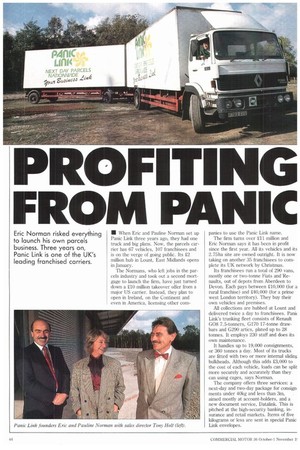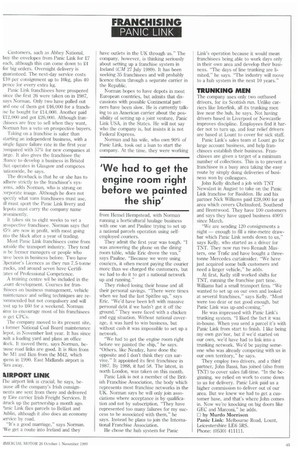Firt•FIT' NG FROM PAN C
Page 42

Page 43

If you've noticed an error in this article please click here to report it so we can fix it.
Eric Norman risked everything to launch his own parcels business. Three years on, Panic Link is one of the UK's leading franchised carriers.
• When Eric and Pauline Norman set up Panic Link three years ago, they had one truck and big plans. Now, the parcels carrier has 67 vehicles, 107 franchisees and is on the verge of going public. Its million hub in Lount, East Midlands opens in January.
The Normans, who left jobs in the parcels industry and took out a second mortgage to launch the firm, have just turned down a £10 million takeover offer from a major US carrier. Instead, they plan to open in Ireland, on the Continent and even in America, licensing other corn panies to use the Panic Link name.
The firm turns over &Al million and Eric Norman says it has been in profit since the first year. All its vehicles and its 2.75ha site are owned outright. It is now taking on another 35 franchisees to complete its UK network by Christmas.
Its franchisees run a total of 290 vans, mostly one or two-tonne Fiats and•Renaults, out of depots from Aberdeen to Devon. Each pays between 210,000 (for a rural franchise) and £40,000 (for a prime west London territory). They buy their own vehicles and premises.
All collections are hubbed at Lount and delivered twice a day to franchisees. Pani( Link's trunking fleet consists of Renault GOB 7.5-tonners, G170 17-tonne drawbars and G290 artics, plated up to 28 tonnes. It employs 230 staff and does its own maintenance.
It handles up to 19,000 consignments, or 360 tonnes a day. Most of its trucks are fitted with two or more internal slidin bulkheads. Although this adds 2,000 to the cost of each vehicle, loads can be split more securely and accurately than they can using cages, says Norman.
The company offers three services: a next-day and two-day package for consign. ments under 40kg and less than 3m, aimed mostly at account-holders, and a new document service, Datalink. This is pitched at the high-security banking, insurance and retail markets. Items of five kilograms or less are sent in special Panic Link envelopes. Customers, such as Abbey National, buy the envelopes from Panic Link for .C7 each, although this can come down to VI for big orders. Overnight delivery is guaranteed. 'I'he next-day service costs n) per consignment up to 10kg, plus 40 pence for every extra kg. Panic Link franchisees have prospered since the first 26 were taken on in 1987, says Norman. Only two have pulled out and one of them got S;46,000 for a franchise he bought for £14,000. Another paid 12,000 and got U6,000. Although franchisees are free to sell when they want, Norman has a veto on prospective buyers. Taking on a franchise is safer than starting an independent business, with a single figure failure rate in the first year compared with 57% for new companies at large. It also gives the franchisee the chance to develop a business in Bristol that operates in Glasgow and competes aationwide. he says. The drawback is that he or she has to adhere strictly to the franchisor's systems, adds Norman, who is strong on corporate image. Although he does not specify what vans franchisees must use, ill must sport the Panic Link livery and Jepots must carry the company name arominently. It takes six to eight weeks to vet a irospective franchisee. Norman says that are now in profit, with most going nto the black after a year of trading. Most Panic Link franchisees come from iut side the transport industry. "Ishey tend o be former managers or people who lave been in business before. Two have )perator's Licences as they run 7.5-tonne rucks, and around seven have Certificates of Professional Competence. A training centre wit be included in the l..ount development. Courses for fran:hisees on business management, vehicle naintenance and selling techniques are re:ommended but not compulsory and will :ost up to £60 for a weekend. Norman iims to encourage most of his franchisees o get CPCs. The company moved to its present site, former National Coal Board maintenance lepot, in November last year. It has since milt a loading yard and plans an office )lock. It moved there, says Norman, be:ause road links are good. It is Skin from he M1 and lkm from the M42, which >pens in 1990. East Midlands airport is m away.
IIRPORT LINK
lie airport link is crucial, he says, be:ause all the company's Irish consignnents are sent from there and delivered )y Eire carrier Irish Freight Services. It ;truck up the partnership a month ago. 'anic Link flies parcels to Belfast and hblin, although it also does an economy iervice by road. "It's a good marriage," says Norman. We get a route into Ireland and they
have outlets in the UK through us." The company, however, is thinking seriously about setting up a franchise system in Ireland (CM 27 July 1989). It has been seeking 35 franchisees and will probably licence them through a separate carrier in the Republic.
Norman hopes to have depots in most European countries, but admits that discussions with possible Continental partners have been slow. He is currently talking to an American carrier about the possibility of setting up a joint venture, Panic Link USA, in the States. He will not say who the company is, but insists it is not Federal Express. Norman and his wife, who own 90% of Panic Link, took out a loan to start the company. At the time, they were working from Hemel Hempstead, with Norman running a horticultural haulage business with one van and Pauline trying to set up a national parcels operation using selfemployed couriers. They admit the first year was tough. "I was answering the phone on the dining room table, while Eric drove the van," says Pauline. "Because we were using couriers, it often meant paying the courier more than we charged the customers, but we had to do it to get a national network up and running." They risked losing their house and all their personal savings. "There were times when we had the last Spitfire up," says Eric. "We'd have been left with massive personal debt if we hadn't got it off the ground." They were faced with a chicken and egg situation. Without national coverage, it was hard to win business, but without cash it was impossible to set up a network.
"We had to get the engine room right before we painted the ship," he says. "Others, like Nexday, have done the opposite and I don't think they can survive." It appointed its first franchisee in 1987. By 1988, it had 58. The latest, in north London, was taken on this month.
Panic Link is not a member of the British Franchise Association, the body which represents most franchise networks in the UK. Norman says he will only join associations where acceptance is by qualification and not by subscription. "They have represented too many failures for my success to be associated with them," he says. Instead he plans to join the International Franchise Association.
He chose the hub system for Panic Link's operation because it would mean franchisees being able to work days only in their own area and develop their business. "The days of line trunking are limited," he says. "The industry will move to a hub system in the next 10 years."
TRUNKING MEN
The company uses only two outbased drivers, for its Scottish run. Unlike carriers like Interlink, all its trunking men Live near the hub, he says. Not having drivers based in Liverpool or Newcastle improves discipline. Employees find it harder not to turn up, and four relief drivers are based at Lount to cover for sick staff.
Panic Link's sales team at Lount go for large account business, and help franchisees establish their business. Franchisees are given a target of a minimum number of collections. This is to prevent a franchisee in a busy area taking the easy route by simply doing deliveries of business won by colleagues. John Kelly ditched a job with TNT Newsfast in August to take on the Panic Link franchise for Basildon. He and his partner Nick Williams paid £28,000 for an area which covers Chelmsford, Southend and Brentwood. They have 100 customers and says they have upped business 4007c since March.
"We are sending 120 consignments a night — enough to fill a nine-metre drawbar which Panic Link sends down to us," says Kelly, who started as a driver for TNT. They now run two Renault Masters, one Trafic and have bought a threetonne Mercedes curtainsider. "We have just acquired some bulk customers and need a larger vehicle," he adds. At first, Kelly still worked shifts for TNT, running the franchise part time. Williams had a small transport firm. "We wanted to set up on our own and looked at several franchises," says Kelly. "Most were too dear or not good enough, but Panic Link was up-and-corning."
He was impressed with Panic Link's trunking system. "I liked the fact it was in-house. When you send a parcel it's with Panic Link from start to finish. I like being my own guv'nor, but if we'd started on our own, we'd have had to link into a trunking network. We'd be paying someone who was already competing with us in our own territory," he says. They employ two drivers, and a third partner, John Bassi, has joined (also from TNT) to cover sales full-time. "In the beginning, we relied on work to come down to us for delivery. Panic Link paid us a higher commission to deliver out of our area. But we knew we had to get a customer base, and that's where John comes in. Now we're knocking on big doors like GEC and Marconi," he adds.
1=1 by Murdo Morrison Panic Link: Melbourne Road, Lount, Leicestershire LE6 5RS.
Phone: (0530) 411111,






























































































































